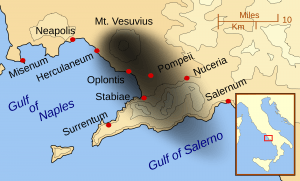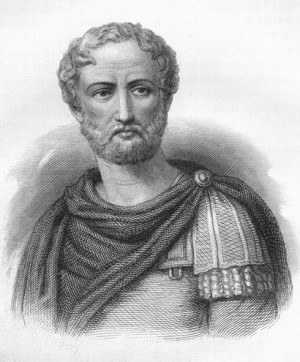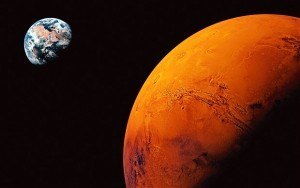On August 24, 79 A.D., Italy’s Mount Vesuvius exploded in one of the largest volcanic eruptions in European history. For two days, the mountain disgorged millions of tons of pumice, ash, and pyroclastic materials into the surrounding landscape for many miles, burying completely the cities of Pompeii and Herculaneum.
One middle-aged man observed this scene with transfixed attention. The commander of the nearby Roman fleet at Misenum, at the northern limit of the Bay of Naples, stood near the shoreline and squinted at the incredible displays that were taking place across the bay. He was shocked to see a dense mushroom-shaped cloud rise steadily upward and spread out laterally across the sky, turning day into the inception of night.
He ordered a detachment of sailors and two secretaries to accompany him to the shoreline, where they could prepare several vessels to sail into the bay and get a better look at what was happening. This commander, a thick, heavy-set man with gleaming blue eyes, possessed an incredible capacity for work, a mind like a sponge, and a probing scientific curiosity about all natural phenomena. He recognized that this might be an opportunity to observe a geologic event unique in history. His name was Caius Plinius Secundus, but he is known to history as Pliny the Elder.
As Pliny made his shoreline preparations, an exhausted messenger arrived from a friend named Rectina, begging him to rescue her and her companion Pomponianus; both of them were trapped by the eruption. Pliny and his party made off in haste for Herculaneum on the other side of the bay. As they drew closer to the city, large volumes of ash and pumice stone began to descend on the boats; and despite his helmsman’s warning that they should turn back, Pliny refused.
He was mesmerized by the eruption, dictating notes frantically to his secretary, who copied them dutifully, his stylus moving rapidly across several wax tablets. The terrified secretary fumbled nervously, pausing only to mutter Ita, domine in obedience at the directions given him by his agitated employer.
Finally they were forced to make for the shoreline near Stabiae. Pliny suffered from asthma, and he was beginning to wheeze, his every breath coating his lungs with more microscopic ash and pulverized pumice. They located Pomponianus, but Rectina was nowhere to be found. Several members of his party wrapped themselves in linen blankets, some even tying pillows to their heads, in an attempt to protect themselves from the fist-sized pumice stones that were now falling with escalating intensity.
Pliny’s breath became more labored, and he felt himself beginning to suffocate as the ash fall grew in acuteness. He gasped orders to his party, telling them to leave him there, and make for the open water. This they did, after an agonizing deliberation. His body was recovered several days later. He was only fifty-six years old.
Who was this polymath, this strange amalgam of public servant, military commander, and scientist? He was born at Como in 23 A.D., received a respectable education in Rome, and embarked on a military career at the age of twenty-three. His frontier service in Germany tempered his scholarly inclinations with the iron of action, and had the additional benefit of bringing him into contact with men of influence in the higher circles of Roman leadership.
After this period, he was trained as a lawyer in Rome. He wisely laid low during the reign of Nero, but later held the post of procurator in Spain, and additionally served as an advisor to the Emperor Vespasian.
During all this time, amid the pressures of work as an administrator, military man, lawyer, and counselor, he managed to turn out treatises on rhetoric, the javelin, and a history of Rome, as well as several other works.
But the only one of his writings to have come down to us is his massive Natural History (Historia Naturalis), a one-man encyclopedia filling thirty-seven books, and purporting to summarize nearly all known knowledge of the day. Pliny lived for work, and was able to subsist on little sleep. His nephew Pliny the Younger describes his famous uncle’s brutal regimen:
He combined a ferocious intellect with unmatched powers of concentration, and the ability to go without sleep…[So] to give himself more time for study, [he] would rise half-way during the night; in winter this would be at midnight or one o’clock, or even two…Before dawn he would visit the emperor Vespasian, and then take care of the affairs of his official government position…On returning home he would resume his studies.
After a light and simple meal (which he often took during the day), he would lie in the sun and have a book read to him aloud while he took notes. He made short summaries of every book he read, and often said that every book, no matter how worthless, had something useful in it…After his rest he usually took a cold bath, followed by a short meal or a nap; then he worked as if he had begun a new day. During the meal a book would again be read aloud to him while he took notes…[Pliny the Younger, Epistulae III.5]
The nephew continues to describe the incredible labors of the uncle, but space forbids us from recounting them in detail here. The picture that emerges of the elder Pliny is of an efficacious, probing mind, fired by the spirit of a true scientist. His Natural History treats thousands of topics in astronomy, mineralogy, zoology, botany, geography, painting, sculpture, and anthropology; it is not a systematic encyclopedia in the modern sense, and the approach is sometimes haphazard.
But therein lies its charm. Pliny ventures his opinions on human nature and philosophy in revealing asides, and discloses his sources (nearly 2000 different books by 473 authors) with a disarming candor. Here, despite all its limitations, is one of the first European attempts at a coordinated, orderly presentation of human knowledge.
He is not exactly a paragon of Latin style. He is terse, and often truncated. Yet it would be impossible for any mortal to stretch eloquence to two thousand pages. Beneath the avalanche of information presented, we can discern a philosophy here. His sympathies lie with the Stoics; and he believes that it is futile to ponder the nature of the Supreme Being, if one even exists. “I consider it a form of human foolishness to inquire about the nature and form of God.” (II.14).
If some God does exist, his view of mankind is apathetic: “It is laughable to believe that a Supreme Being devotes attention to the concerns of man.” (II.20). At times he rises to rhapsodic profundity, as here:
Fortune alone is called and named , alone accused, alone pointed out, alone thought of, alone lauded, alone condemned and alone is heaped with insults; thought fleeting and blind by most, She is contumacious, errant, and erratic, and favoring those who are undeserving. To Fortune all is charged, and to Her all is credited. She inscribes the pages of all men’s ledgers. God is proved uncertain: Chance itself takes the place of God. (II.22).
From the comfortable distance of two thousand years, Pliny’s many errors have often been ridiculed; one historian called his work a “lasting monument to Roman ignorance.” There is some truth in this harsh indictment. One can open Pliny’s volumes almost anywhere and find some credulous assertion that places him squarely in his era.
So, for example, he believes that the heads of snails can cure a headache (XXIX.112); that a good eye ointment is made by letting a snake rot in a jar, and then pounding with saffron the maggots that therein breed (XXIX.120); or that a snake can be killed if a man spits in its mouth (XXVIII.7). His chapters on astronomy are painfully dated, and he shows little understanding or sympathy for the cultures of barbarian peoples.
Yet it is a matter of perspective. In Pliny’s day, the far regions of the world were as remote and inaccessible as Mars, Venus, and the moon are to us today. Even modern scientists, we are told, know today less about the Earth’s ocean floor than the surface of the moon. How much do we really know about the celestial bodies beyond Earth?
Do we not also rely on guesswork and conjecture, just as Pliny did when describing India or the heart of Africa? Will not our own remote descendants, two thousand years hence, laugh at our own self-important books? Pliny did the best he could with the tools that he had available to him. He was not a fool; he was just confined by the boundaries of his era.
There is great wisdom, even a quiet dignity, in these old volumes. Pliny has the true scientist’s concern for worldly affairs. Instead of looking to heavenly deities for our salvation, we should strive to help each other: “For a man to help another man—this is god, and this is the road to eternal glory.” (II.18). The development of coinage and interest, he believes, has done man more harm than good, as it has multiplied exploitations and inequalities among men (XXXIII.13).
Despite all of his absurdities, all of his inaccuracies, and all of his credulity, Pliny emerges from the pages of his volumes as an urbane and affable companion in the exploration of the natural world. Although able to critique his sources, he never indulges in the type of diatribe against other authors that too often mar the works of some of his contemporaries. He deserves a place in our pantheon because he worked literally day and night to impose order on a chaotic and inscrutable world.
I recently bought all ten volumes of the Natural History. I can converse with him whenever I want, and he occupies a prominent place on my bookshelf. The set was expensive, but it did not bother me to pay several hundred dollars to have the original text. Do you want to know why I did it?
It was out of respect.
Read More: Into The Wild



Too often, modern people lose sight of the importance of process. You have touched upon the importance of process and how it strengthens a mind like lifting weights strengthens the body. Pliny the Elder seems to have imposed order on himself in order to impose order on all he could survey.
Great post man.
Its always inspiring to read about people from a much distant past, and see the impact they can still have in this modern day.
This I believe is what I am currently chasing. I thought the “Red Pill” philosophy was JUST about women and seeing how much pussy you can get to snap you out of the pink web a worthless bitch had you in but, looking at it now with more wisdom, knowledge, and experience, I can see it is much more than just fucking women. Or, better yet doing what is in our nature. Screw that noise I want more.
I want people from the future to look back on my work and at least give it a thought, have a feeling, opinion, etc. Just something. Yes its a bit egotistical I wot lie but, at the same time am I just walking this earth for nothing? How will my life even matter if only 10 years after my death nobody will give a fuck about it? Was I even here?
This is why posts like these are always encouraging. I want that. That is what I want to be honest. I want to keep the lights on as long as I can before I fade out and become another brick in the wall. Chasing ass seems like a past time now. Almost as if I saying “That’s it”? This is why I was mad at my close friend because he fucked around with a chick I like? This is what I was almost torn apart emotionally for? This is what made me depressed and feel like the world was going to end? THIS? No. I want more than what my nature has given me. I want to chase what has not been reached by many. I don’t want to be another light bulb that can easily be replaced when it fades out. I want to be a creator that makes the light bulbs. I want to become a statue. Not the person that cleans it.
http://associationofchronos.com/2015/02/02/invisible-death/
Great post again man.
This is a great comment, Chronos. You caught the essence of what I was trying to convey.
Appreciate that man thank you. I always enjoy your articles and Tweets. Real inspiring shit. Keep up the good work.
I liked his work, particularly the book on men’s unusual skills and achievements. What edition did you get?
Loeb Library (of course!). Entire set. Original text and translation.
“For a man to help another man—this is god, and this is the road to eternal glory.” (II.18)
Sometimes the masses fail the grasp the simple truths in life by looking at “great” unproven ones offered by religion.
That quote isn’t a counter-view to what the gospel actually says though. “Love your neighbor as yourself,” anyone? Some of what Pliny the Elder wrote is actually very in-tune with the gospel.
Yes, Pliny was actually a very wise and considerate man.
Even withthe fact that I want to dedicate myself to a few points in my life than others,
i would like to be as versatile as this man was, he seems to have had a fulfilled
life by enjoying the process as you said.
And out of your commentary, but just to complement his thuoghts about god: “Live
a good life. If there are Gods and they are just, then they will not care how
devout you have been, but will welcome you based on the virtues you have lived
by. If there are Gods, but unjust, then you should not want to worship them. If
there are no Gods, then you will be gone, but will have lived a noble life that
will live on in the memories of your loved ones.” (marcus aurelius)
That’s a reply to Bear Hands, can someone fix that? i can’t post again!
Sounds like a fascinating man. Just checked out a review on amazon.com which compares him to Borges and Calvino because of the surreal things he comes out with.
That’s a bust of Vespasian, not Pliny.
You were correct, Dmitry. Thanks for bringing that up. I just replaced it with a portrait of Pliny, as a past artist has rendered him.
😀
There is a very readable account of Pliny’s fatal expedition across the Bay of Naples in Robert Harris’ novel, Pompeii. He was indeed a remarkable man.
Respect, indeed. Always a pleasure to read about the lives of great men who stayed motivated by sheer awe at all that surrounds us. Thanks for bringing us yet another role model to aspire to, Quintus.
Any talk on how he was able to keep his mind so focused with “unmatched powers of concentration?”
I have to say, this is one of my biggest weaknesses.
Superb stuff, as always.
He was just one of those guys who had an unrelentingly active mind. He could never sit still. He basically worked all day and then most of the night, as the quote from his nephew shows.
Some geniuses are like this.
thanks for this article quintus.
Great post.
And the “goodfellas” quote at the end made me laugh.
Lol!!
I’m glad someone picked up on this….!
At least we know someone here has a sense of humor!